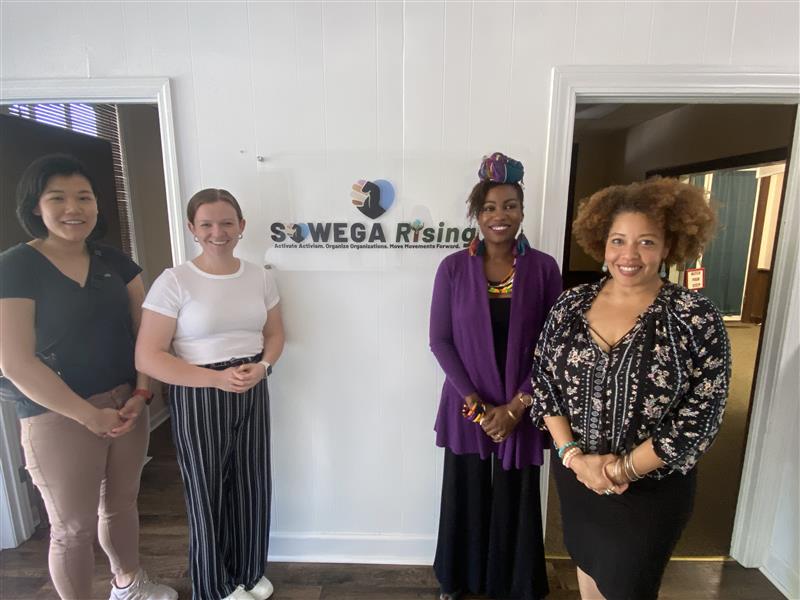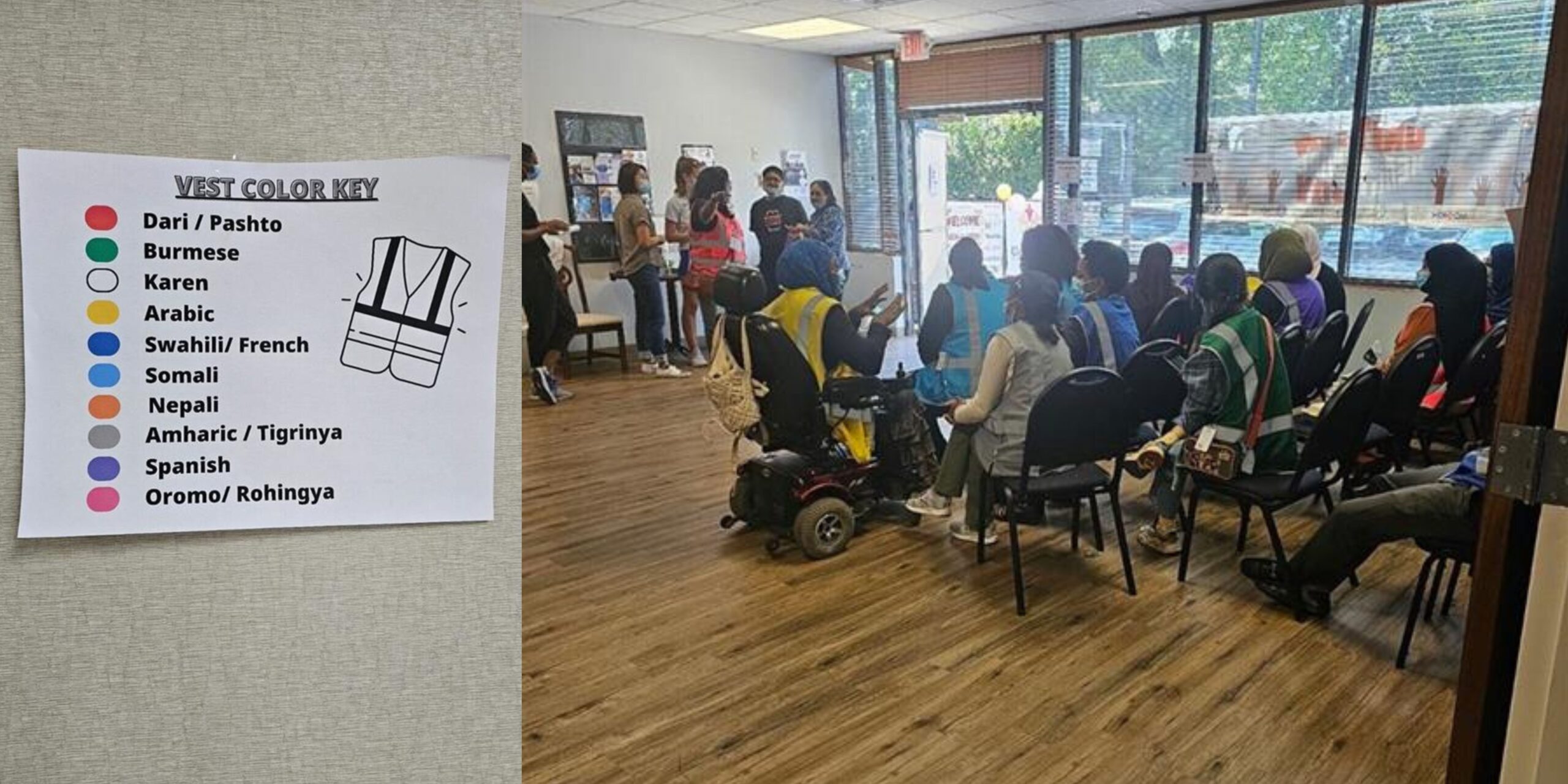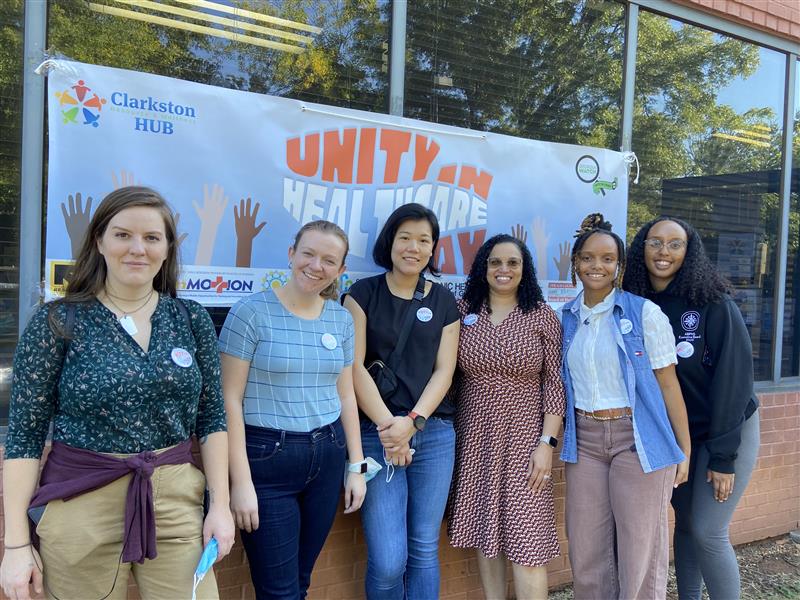Lessons in Community Engagement: Georgia Site Visits Provide Windows into Rural Outreach and Language Justice in Action
Last month, staff members from our Medical Debt team had the privilege of visiting two of our state partners in Georgia. SOWEGA Rising and Georgia Watch are both part of Community Catalyst’s nationwide efforts to reduce the burden of medical debt and hold hospitals accountable to their communities. We connect regularly to strategize how to build movements with local hospital systems and advocate for stronger protections statewide for people across Georgia, from the urban center of Atlanta to the rural constituents in southwest towns like Albany. After almost three years of Zoom calls together, meeting in person was an enlightening experience that allowed us to have a human connection beyond what is possible through virtual platforms and gain deeper insight into community learnings.
A Day in the Office of SOWEGA Rising
We flew into an airport with one terminal in Albany, Georgia. It looked closer to an airplane hangar than the sprawling Atlanta airport we had come from. Albany is located in southwest Georgia and is the home of SOWEGA Rising, one of Community Catalyst’s partners working to address the medical debt crisis with federal and state policy solutions. In a city of 73,179 people, roughly 33-35% of residents live under the poverty line. South and East Albany, which are considered the poorer, predominantly Black parts of the city, have more food deserts, less access to resources, and less development and investment than other parts of the town. Being in person in the city allowed us to have a better perspective of the challenges the community faces such as access to transportation, health care, and food.
When we arrived, Sherrell Byrd, Co-Founder and Executive Director, and Alysia Cutting, Rural Health Equity Director, showed us around their office. It sits just a few blocks away from Phoebe Putney Memorial Hospital, the local hospital system SOWEGA Rising has been actively trying to engage throughout our medical debt work. They have advocated for a more comprehensive financial assistance policy and to add community voices into Phoebe’s policies, actions, and community benefit efforts. However, the proximity to the hospital also raises concerns for SOWEGA Rising as Phoebe Putney continuously looks to expand its campus, often even disrupting historical landmarks.
Sherrell and Alysia talked us through a number of events they are going to be running and attending over the course of the next few months. Whether it’s community education on financial assistance programs or fighting to protect Medicaid coverage, a common theme across SOWEGA’s work in Southwest Georgia is the unique challenges of working in rural America. Community health care in Southwest Georgia means spanning multiple counties and putting many miles behind the driver’s wheel. This was very apparent in our travels. Sherrell and Alysia spoke of the struggle to access broadband and how that deeply impacts outreach efforts around the Medicaid Unwind. They talked about a community “baby shower” they were running in a rural community that recently had their closest labor and delivery center close, so expecting mothers now had to travel an extra 30 minutes for care.
This visit was truly an eye-opening learning experience. Opportunities for face-to-face relationship building are becoming rarer in a mostly online world, but they never disappoint. Even in casual conversations you are able to see how deeply connected medical debt is to other issues of health care costs, access, and quality, especially in the context of rural America.

Joining Georgia Watch for the Unity in Healthcare Day
After Albany, we traveled to Clarkston, to join Georgia Watch for their first “Unity in Healthcare Day,” an event aimed at bridging the gap between community members, health care services, and providers. Clarkston, a suburb of Atlanta, is known as one of the most diverse cities in Georgia and is home to many resettled refugee communities. Representatives at the event from the U.S. Department of Health and Human Services remarked that it was the first of its kind in the country to offer health resources in multiple languages, including Dari, Pashto, Burmese, Karen, Swahili, French, Somali, Nepali, Amharic, Tigrinya, Spanish, Oromo, and Rohingya. Free to the public, the event featured community-based organizations and offered vaccinations, blood pressure screenings, all with interpreters and translated materials in the languages most commonly spoken in the community.
It was an incredible experience to be able to witness the power of language justice to build true community spaces. People who did not have English language comprehension could be paired with an interpreter who spoke their native language. The interpreter would walk with the community member to visit each booth to learn more about the resources available. It was a remarkable commitment to language justice, ensuring that the community member was able to converse and ask questions in their own native languages.

While hundreds of people attended the event, a particular instance stood out where a community member who only spoke Burmese was visiting a booth with their interpreter. This particular booth featured resources on diabetes education, and the community member shared they suffered from diabetes but did not have knowledge about how to manage the condition. The organization running this booth had a resource guide on how to manage diabetes in the Burmese language, and it was the first time the community member was able to learn about diabetes in their native language.
Far too often, refugees are resettled in an area they are unfamiliar with and left to navigate resources on their own in a language they have never been exposed to before.
The incredible partnership between Georgia Watch, Refugee Women’s Network, Friends of Refugees, and the Hispanic Health Coalition of Georgia is a standout example of organizations building partnerships and pooling a wealth of resources to address the unique challenges of serving a growing and diverse community base.
Additionally, the event kicked off the opening of the Clarkston Resource and Wellness Hub, a welcoming space that is able to offer the Clarkston community a culturally sensitive health clinic with multiple health resources and services.

Overall, the site visits were an incredible experience that allowed us to learn so much about different communities, connect on a human level, and gain insight on community engagement strategies. We were able to form lasting memories and hope to be able to visit again in the future.